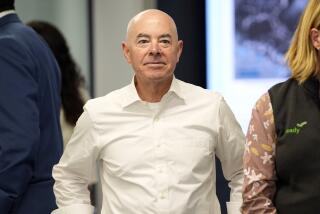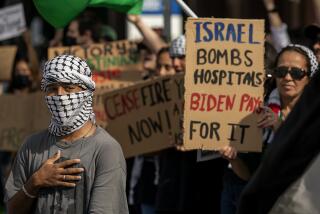Rally Decries China Action on Refugees
Hundreds of Korean Americans, joined by members of other ethnic communities, held a peaceful but vociferous demonstration across the street from the Chinese Consulate in Los Angeles on Monday to protest Chinaâs repatriation of seven North Koreans, declared as refugees by the United Nations.
Chanting in English and Korean, âlet my people go,â and âprotection and human rights for North Korean refugees,â protesters also delivered a letter for Chinaâs President Jiang Zemin, urging him to ensure the safety and well-being of the refugees and obtain their immediate release from the North Korean government.
âUnless your government reverses the policy of forced deportation, the lives of all North Korean nationals in your territory would come under great peril,â said the letter, which was read at the rally by Sang-Chul Kim, secretary general of the International Commission to Help North Korean Refugees.
Kim, whose organization has offices in Seoul, Paris and Washington, came to Los Angeles, home to the largest concentration of Koreans outside Asia, to drum up support for the movement from both the Korean American community and mainstream society.
About 100,000 to 300,000 North Koreans, who have fled their homeland because of more than six years of famine, now live in the northeastern region of China near the border with North Korea.
âThe mere act of crossing the border into China constitutes an act of treason under North Korean law,â the letter said. âOnce they are repatriated to North Korea, punishment by torture and death awaits them.â
The communication from the international group, co-chaired by Nobel Prize winner Mairead Corrigan-Maguire of Northern Ireland, was accepted by a U.S. State Department official acting as an intermediary because Chinese officials did not wish to accept it directly from the group.
âI came to the demonstration even though I am ill today and should be going to see my doctor right about now,â said Bon-Ok, Lee, 71, a Koreatown resident who had come with a friend. âWhen I heard about those poor North Koreans at my church yesterday, I couldnât stop crying.â
âIt just tears my heart to think what those poor North Koreans must face in North Korea,â said Joong-Jin Kwon, 61.
âIt makes me very, very angry to think what the Chinese government did to them.â
Celes King, head of the Congress of Racial Equalityâs Los Angeles chapter, said that as an African American whose people have known much oppression, it was natural to show his support for the North Korean refugees.
âThis is an international tragedy which must be addressed,â he said.
Xue Bing, a spokesman for the Chinese Consulate, said the seven are not refugees by international practice or Chinese law. He added that Chinaâs decision also was sound from the view of safeguarding the stability and security of the Korean Peninsula.
The repatriated Koreans, the youngest of whom is 13, entered China in mid-November to seek food. Then, crossing Chinaâs border with Russia, they were detained by Russian guards. They had hoped that Russian authorities would allow them to go to South Korea, but Russia sent them to China on Dec. 30.
Turning down appeals from both U.N. and South Korea officials, the Chinese government sent them back to North Korea on Jan. 11.
On Jan. 13, the United Nations announced that it had protested to the Chinese government over the deportation of the seven, whom the U.N. had recognized as refugees.
Ann Lau, former president of the Visual Artists Guild and a Chinese American who grew up in Hong Kong, compared the North Korean situation to what happened in China in the late 1950s and early 1960s, when a disastrous economic policy resulted in the starvation of 30 million and prompted tens of thousands of refugees to stream into Hong Kong.
âThe British government, unable or unwilling to handle so many refugees, began sending these people back to China,â she said. But ultimately, public outcry and world condemnations prompted the British government to allow refugees into Hong Kong.
The policy contributed to making Hong Hong the seventh biggest economy in the world at the time it was returned to China in 1997, she said. âWhen the Peopleâs Republic of China first opened up its economic zones and began the change into a market economy, it was these same former refugees who returned to the PRC to help transform its economy.â
More to Read
Sign up for Essential California
The most important California stories and recommendations in your inbox every morning.
You may occasionally receive promotional content from the Los Angeles Times.










